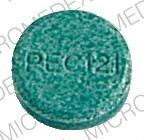ergotamine – sublingual, Ergomar
WARNING: This medication has rarely caused a very serious lack of blood flow to the hands and feet (peripheral ischemia) or to the brain, which could cause a stroke. The risk is increased when this medication is taken with other drugs that can affect the removal of ergotamine from your body. Examples include azole antifungals, macrolide antibiotics, HIV protease inhibitors, among others. See also Drug Interactions section.
USES: This combination medication is used to treat or prevent a certain type of headache (vascular headaches such as migraine headaches and cluster headaches). Ergotamine helps narrow widened blood vessels in the head, reducing the throbbing effects of vascular headaches.
HOW TO USE: Place one tablet under the tongue, allowing it to dissolve as directed by your doctor. Do not chew or swallow the tablet. Do not eat or drink while the tablet is dissolving in your mouth. Dosage is based on your medical condition and response to therapy. This medication works best if taken at the first signs of the headache. The maximum dose is 3 tablets in any 24-hour period and 5 tablets in any 7-day period. This medication should only be taken as needed, not for long-term daily use. This medication may cause withdrawal reactions if used regularly for a long time or in high doses. In such cases, rebound headaches may occur upon discontinuation. Report any such headaches to your doctor immediately. Inform your doctor if you notice increased use, decreased effectiveness, worsened headaches, increased frequency of headaches, or more than 2 headache episodes per week. Your doctor may need to adjust your medication or add another to prevent headaches.
SIDE EFFECTS: Nausea, vomiting, and dizziness may occur. If any of these effects persist or worsen, notify your doctor or pharmacist promptly. Serious side effects may include slow/fast/irregular heartbeat, tingling/pain/coldness in the fingers/toes, whitish fingers/toes/nails, loss of feeling in the fingers/toes, bluish hands/feet, muscle pain/weakness, severe stomach/abdominal pain, lower back pain, little or no urine, chest pain, vision changes, confusion, slurred speech. Seek immediate medical attention if any of these rare but serious side effects occur. An allergic reaction to this drug is unlikely, but seek immediate medical attention if it occurs. This is not a complete list of possible side effects. If you notice other effects not listed above, contact your doctor or pharmacist.
PRECAUTIONS: Before taking this medication, tell your doctor or pharmacist if you are allergic to ergotamine or other ergot alkaloids, or if you have any other allergies. This product may contain inactive ingredients that can cause allergic reactions or other problems. This medication should not be used if you have certain medical conditions. Before using this medicine, consult your doctor or pharmacist if you have: blood circulation disease, uncontrolled high blood pressure, nutrient deficiency, heart/blood vessel disease, liver disease, kidney disease, severe infection, severe itching. Before using this medication, inform your doctor or pharmacist about your medical history, especially if you smoke, have diabetes, or have high blood pressure. This drug may make you dizzy. Do not drive or operate machinery until you are sure you can do so safely. Limit alcoholic beverages. This medication may harm an unborn baby. Therefore, it must not be used during pregnancy. Men and women using this medication should use two effective forms of birth control. This drug may pass into breast milk and could have undesirable effects on a nursing infant. Therefore, breast-feeding is not recommended while using this drug.
DRUG INTERACTIONS: Drug interactions may change how your medications work or increase your risk for serious side effects. This document does not contain all possible drug interactions. Keep a list of all the products you use and share it with your doctor and pharmacist. Other medications can affect the removal of ergotamine from your body, which may affect how ergotamine works. Examples include boceprevir, mifepristone, telaprevir, HIV NNRTIs, a certain combination HIV medication, certain antidepressants, among others. If you also take "triptan" migraine drugs, you will need to separate your doses of these drugs to reduce the risk of serious side effects. Check the labels on all your medicines because they may contain ingredients that could increase your heart rate or blood pressure.
QUESTION
OVERDOSE: If overdose is suspected, contact a poison control center or emergency room immediately. US residents can call their local poison control center at 1-800-222-1222. Canada residents can call a provincial poison control center. Symptoms of overdose may include severe dizziness/drowsiness, loss of feeling in the fingers/toes, rapid/weak heartbeat, bluish hands/feet, seizures.
NOTES: Do not share this medication with others. Certain foods/beverages or food additives as well as lifestyle patterns may bring about a migraine headache. Avoiding these "triggers" may help decrease the frequency of migraine headaches. Consult your doctor for more details.
MISSED DOSE: If you miss a dose, take it as soon as you remember. If it is near the time of the next dose, skip the missed dose and resume your usual dosing schedule. Do not double the dose to catch up.
STORAGE: Store at room temperature away from light and heat. Brief storage between 59-86 degrees F is permitted. Do not store in the bathroom. Keep all medicines away from children and pets. Do not flush medications down the toilet. Properly discard this product when it is expired or no longer needed. Consult your pharmacist or local waste disposal company for more details about how to safely discard your product.
Information last revised March 2013. Copyright(c) 2013 First Databank, Inc.


